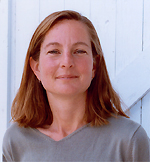|
By Kim Todd
 In May, the Sierra Club Board of Directors selected its new president: Jennifer Ferenstein of Missoula, Mont. In May, the Sierra Club Board of Directors selected its new president: Jennifer Ferenstein of Missoula, Mont.
The youngest woman to serve as Club president - she's 36 - Ferenstein is also the first to represent the Northern Rockies region. An avid outdoor enthusiast, she got the news that she had been elected to the board in 1998 when, after rafting the San Juan River in Utah, she called her home phone to find a flurry of messages of congratulations.
Drawn to the Sierra Club by its ability to bring the wildlands issues she cares about to a national level, Ferenstein has been deeply involved in efforts to pass the Northern Rockies Ecosystem Protection Act. In addition to serving as a leader with the Montana Chapter and the board, she has taught for the Wild Rockies Field Institute, tracked and studied golden eagles and worked for the Montana Environmental Information Center.
The Planet caught up with her in early summer, as she was settling into the president's office at national headquarters in San Francisco.
Planet: What project that you've worked on so far has given you the most satisfaction?
Ferenstein: I helped stop a timber sale on the Salmon-Challis National Forest in Idaho. It was called the"Black Pepper" timber sale and on the cover of the draft document it had a picture of this pepper shaker with all these animals coming out of it. I wrote an administrative appeal, and helped stopped the sale because it cut into a roadless area and they hadn't done adequate analysis. That was one of the most rewarding things I did because I could go back to the place where the timber sale had been scheduled and see the results of my work.
Planet: What do you hope to accomplish as president?
Ferenstein: I'm looking forward to making substantial long-term shifts in policy. While blocking the timber sale was satisfying, at the same time, it made me more aware that those types of victories are transient. Until you change the underlying policies, those battles are just going to happen over and over again. For example, getting the roadless rule to stick is an incredibly important first step in getting long-term wildlands protection.
Planet: When you worked as natural resource advisor to Montana gubernatorial candidate Mark O'Keefe, attack ads painted you as a "radical environmentalist" because of your involvement with the Club. What are some ways the Club can diffuse that hostility, particularly in rural areas?
Ferenstein: We have to put a more human face on the Sierra Club. There are interests out there - the so-called Wise Use movement is one - that benefit from vilifying environmentalists. We need to debunk the myths that environmentalists are to be held responsible for the changing economic conditions that affect all parts of the country, from the "energy crisis," to the listing of certain endangered species, to commercial logging on public lands. The reality is that it has a lot to do with increased globalization of markets and subsidies to industries that end up hurting small family farmers and small mills.
It's up to the Sierra Club to help people feel like they can make a difference. We need to be good neighbors and reach out to people in rural communities; we always have to be out there with real solutions and vision. We also have to support people who want to stand up and promote environmental values in their communities because in some places in the country there is a real atmosphere of violence and intimidation.
Planet: Can you think of a specific time where you were able to change someone's mind about the Club?
Ferenstein: I feel like I change people's minds all the time just by talking with them. For example, the other night I was picking someone up at the airport in Missoula and I was talking to the security guard. He asked me what I did and I said I was president of the Sierra Club. Then he asked if I had any tree spikes in my pocket. I ended up having a great conversation with him, explaining that no, the Sierra Club isn't an eco-terrorist organization. He also thought we were anti-gun, and I told him that we represent a very diverse membership base, some of whom are hunters, and that we're out there to protect habitat for a variety of uses. I'm sure he doesn't think the same of the Sierra Club as he did before.
Up to Top
|